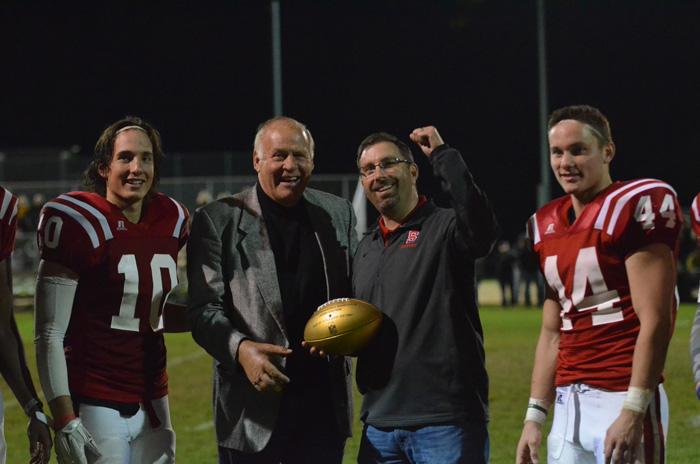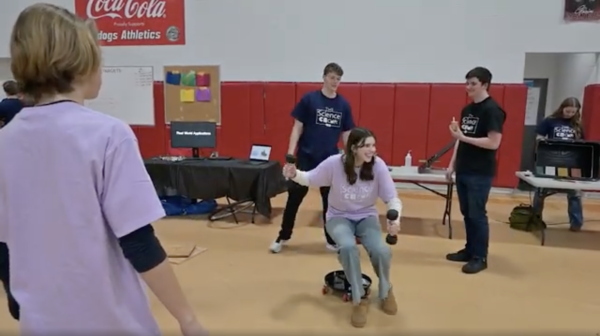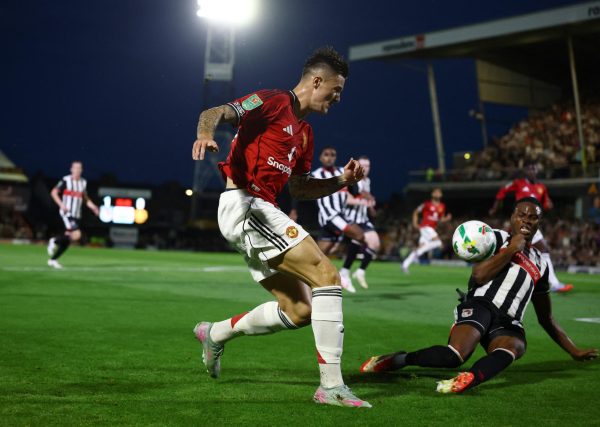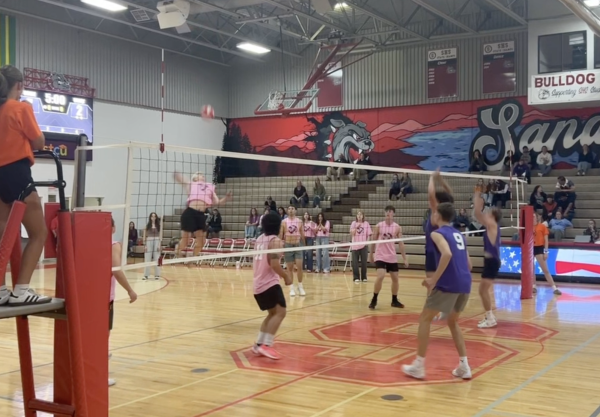THE CEDAR POST INTERVIEW WITH FORMER NFL STAR JERRY KRAMER
Former Sandpoint star talks SHS, concussions and Aaron Rodgers.

Former NFL standout Jerry Kramer presents the NFL’s Golden Ball to Athletic Director Kris Knowles. Kramer graduated from Sandpoint High School before starring for the Idaho Vandals and the Green Bay Packers.
Green Bay Packers legend Jerry Kramer made an appearance at Memorial Friday night’s game against Lakeland and held a presentation at halftime.
In honor of the 50th anniversary of the Super Bowl, the NFL has launched the Super Bowl High School Honor Roll initiative. All players and coaches that have ever been on an active Super Bowl roster get to return to their old high schools to deliver and present a Wilson Golden Football.
During the halftime presentation, Kramer gave a short speech about his days at Sandpoint High and how they shaped the the rest of his career.
He recounted a story with his position coach, Dusty Kline. During practice, Kline pulled him aside and told him, “You can — if you will.”
It took Kramer a while before he finally understood what Dusty meant: If you have the right mindset, the willpower, the effort and the desire, you can-if you will.
Kramer began his football career here in Sandpoint as an offensive lineman under Coach Cotton Barlow in the 1950s. He was then recruited to the University of Idaho where he played for four years. After a standout collegiate career, he was selected 39th overall by the Green Bay Packers in the 1958 NFL draft.
At Green Bay, Kramer played with perhaps one of the most renowned football squads of all time. He was also coached by the one of the best coaches in all of sporting history, Vince Lombardi. In addition to playing on the offensive line, Kramer doubled as a field goal kicker.
Kramer and the Packers went on to win three NFL titles and the first two Super Bowls in his 10 years with Green Bay.
Before Friday night’s regular season home finale against Lakeland, Kramer spent a few minutes answering questions.
Q: How did your time at Sandpoint High influence your collegiate and professional career?
A: Well, it all started here. Everybody has to start someplace. You either start, and you have a certain amount of success, or you start and have a certain amount of failure. If you have success, then you move on. And the next level, of course, is college football. And if you have success there you’re going to move on to the next level if you want. So, without a good start, and without a foundation, and a willingness to work — it’s a lot of work.
There’s a lot of conditioning, a lot of exercise, a lot of pain, and a lot of time put in toward it. But if you’re competitive and you enjoy it, it’s all worth it. It was all worthwhile through high school. Through that I got the chance to play in college and the chance to play professionally. But without the start, I wouldn’t have gone anywhere.
Q: What was it like being coached by the legendary Vince Lombardi? What is something about Vince that the world doesn’t already know?
A: He was a wonderful coach, a wonderful tactician, and he understood abilities. Most of us in life just drift through life, just getting by, just doing what we have to to stay out of trouble a bit, not get in too much grief. And he made you want to work harder, and he got your emotions involved in the game and got you emotionally involved in the game to where you wanted to play a perfect game.
You knew you couldn’t. It is virtually impossible, but you can get very close. He had us emotionally, intellectually, spiritually involved in the game and he asked us to use every ounce of our God-given ability.
And if we didn’t, he’d be honest. He’d say, ‘move it, you’re not putting out, you’re not giving me all you have.’ So you’d get in a habit where you do as much as you could possibly do and when you gave him everything, he was happy. He’d pat you on the back and tell you what a wonderful job you did and what a great kid you were, but he wanted every ounce of your energy. He didn’t want you to save anything for tomorrow.
Q:The NFL is a lot different today than it was before. What are some of the things you think have changed for better or for worse?
A: The NFL has experienced an explosion in growth. Not gradual growth, not great growth, explosive growth. Normal inflationary spiral in our country during the last 40 years have increased on a factor of about 10 to 15 percent- the NFL has increased by 300 percent.
So it’s not even close to anything else in the world that we know about. It’s … a great game. But it’s also a little intoxicating. You’re getting a lot of money, … all of the girls want to spend some time with you, news people want to spend time with you, and everybody tells you how wonderful you are.
And it’s just almost impossible to overcome that until you get a little more maturity and a little more growth and a little more experience and that comes after about five years in the NFL. So that’s one of the problems in the NFL. The kids are immature, but they’re growing, and it’s gonna take them a while to mature.
Q: There’s been a lot of pushback about concussions in the NFL. What do you think is the solution?
A: I don’t think we know all we should know about the concussions yet. We are narrowing that down, and we are aware of the chronic nature of the problem. And it’s a problem on a large scale. So we have to do something about it, but we have to know more about it right now than we do. And we are working on a lot of the memory diseases — the Alzheimer, the dementia — we are working on it. And you know I think we ought to be a little careful about it.
Q: What do you think about the NFL implementing 33 yard PATs?
A: I’m undecided a little bit. I think the game has been very successful the way it is, and I think we ought to think twice before we mess with it just to mess with it for television just because we haven’t done anything new for a while. I don’t think it’s a real smart thing to do. So I just think we ought to be very cautious about changing any aspect of the game.
Q: Would you take Aaron Rodgers, Brett Favre, or Bart Starr as the best all-time Packers quarterback?
A: We’ve been extremely fortunate to have some of the best quarterbacks to play the game. And it’s almost impossible to pick them apart.
Aaron has got another five, six, seven years left to play. And he might have the potential to be the best.
But right at this point, if you give me my running game, and my old team, I’d take Bart. Because Bart was the best I’ve ever encountered in terms of winning for the team. Not to win for Bart, not to make numbers for Bart, not the completions or percentages or anything else, he wanted to win the game. We ran the ball and we had a great running game and we were very successful at it and we were interested in winning. We weren’t interested in stats or numbers or anything like that. And I don’t think Aaron is that way.

Oakley Pettit is a senior and is Sports Editor for the Cedar Post. This is his second year on staff.

Lauren Sfeir is a Senior and is Photo Editor for the Cedar Post. This is her second year on staff.









